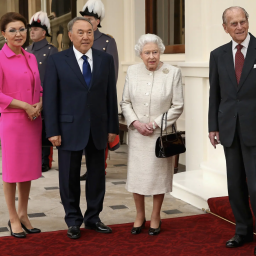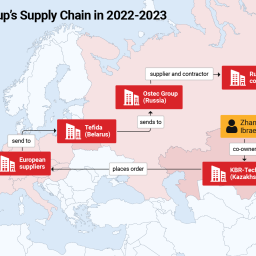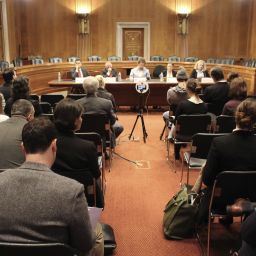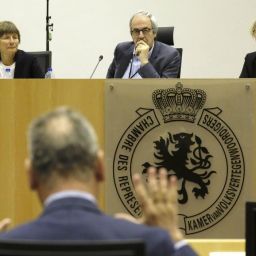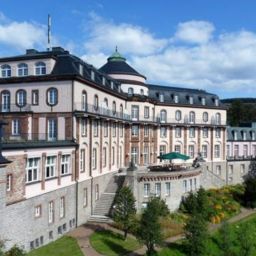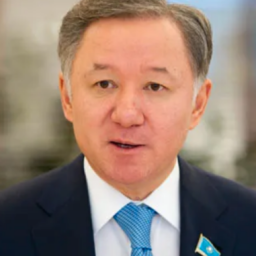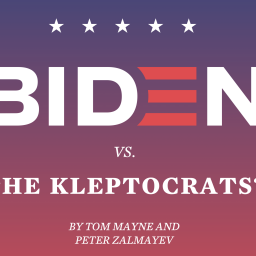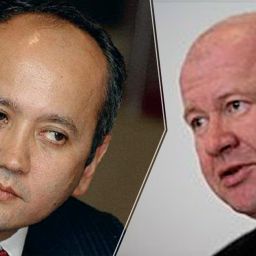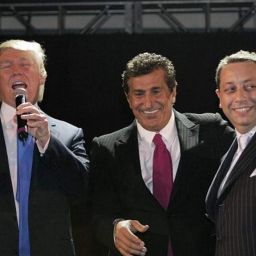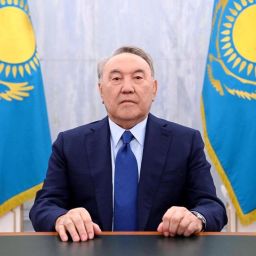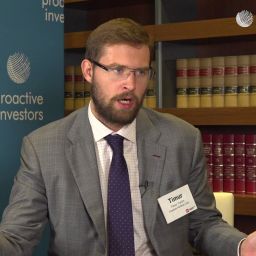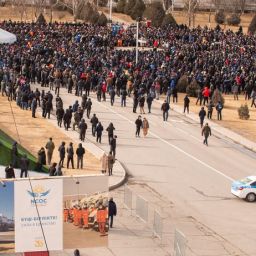When U.S. political website Washington Babylon published an article in December 2017 claiming that special counsel Robert Mueller was looking at a rather obscure Bulgarian-born political consultant, it did not, perhaps understandably, generate many headlines. Ultimately, the man in question, Alexander Vassilev Mirtchev, was not indicted as a result of Mueller’s investigation and he is not named in the recently released redacted report.

But Mirtchev’s career highlights the often murky links between those lobbying for the interests of foreign powers and the political infrastructure of the United States. As this report will discuss, Mirtchev’s extensive work with the autocratic government of Kazakhstan calls into question the links he has forged with the Republican Party and a variety of think-tanks in Washington DC, links that continue to this day.
For example, a series of leaked emails – revealed here for the first time – indicates a rather curious relationship between Mirtchev and the current U.S. Ambassador to Poland, Georgette Mosbacher.
Reports that Mirtchev has also been investigated by the FBI for alleged money laundering and fraud only deepens the concern about the nature of these relationships. It is in the public interest for there to be an examination of these links, and the origins of Mirtchev’s seemingly limitless wealth.
Bulgarian Communist to United States’ citizen
Bulgarian Communist to United States’ citizen Mirtchev’s path to DC’s political elite is a rather remarkable story. He was born in 1957 in Bulgaria, and served from the late 1980s as the head of the Komsomol, the Communist Youth Party of Bulgaria. Just before the Communist Party was forced out of power in Bulgaria in February 1990, Mirtchev was elected to serve in the country’s Supreme Soviet, the Soviet equivalent of a parliament.
After the fall of the Soviet Union, Mirtchev moved to America, and started to work for Stewart & Stewart, a Washington DC based law firm. In 1992 he founded Krull Corporation, a U.S. consulting firm. At some point he even acquired U.S. citizenship – a right almost universally denied to high-ranking former Communist officials, leading to a belief in some circles in Washington DC that Mirtchev may have been an intelligence asset for the United States while he was an official in Bulgaria. Over the next decade Mirtchev created an extensive network of contacts in Washington, especially members of the Republican Party – Rudy Giuliani, Henry Kissinger, John McCain, Lindsay Graham, amongst many others.
Rakhat Aliyev – former son-in-law to Kazakhstan’s first president Nursultan Nazarbayev – relates in his book The Godfather-in-Law that during one of Mirtchev’s first conversations with Nazarbayev’s daughter Dariga, Mirtchev tried to impress her by speaking about meetings he had had with Condoleezza Rice and Dick Cheney.
Despite being well-known in DC political circles, Mirtchev stayed very much out of the public eye until 2008 when media reports2 indicated that he had been working for at least six years for the government of Kazakhstan, an autocratic country often described as a ‘kleptocracy’3 – where a nation’s rulers enrich themselves at the expense of the state. Mirtchev seems to have no qualms representing people or governments with dubious reputations.
One of his early clients was Oleg Deripaska, a Russian oligarch who made his money in Russian aluminium in the 1990s, an individual barred4 from entering the U.S. in 2006 over fears that he was tied to Russian organised crime5, an accusation that Deripaska has denied. Through Global Options Management, Mirtchev also worked with Gulnara Karimova, the daughter of the then president of Uzbekistan, who would be caught up some years later in an investigation by the U.S. authorities who alleged in 2016 that she received bribes of up to $800 million from telecoms companies looking to gain access to Uzbekistan.6 Karimova is currently serving five years in Uzbekistan for crimes including embezzlement, extortion, and tax evasion.7 (There is no suggestion that Global Options Management worked for Karimova during the time these crimes were committed.)
Mirtchev helps ‘launder’ Kazakhstan’s reputation
The background to Mirtchev’s hiring by the Kazakh government in 2002 is a scandal that came to be known as ‘Kazakhgate’: an American businessman, James Giffen, had been arrested in the United States, accused of setting up schemes that benefitted high-ranking Kazakh officials.
One such official was the then President of Kazakhstan himself, Nursultan Nazarbayev, whom the U.S. Department of Justice alleged to control a Swiss bank account that held around $87 million, money that was viewed as proceeds of bribery on behalf of Giffen.8
Ultimately, the potentially explosive trial dragged on for years amidst legal arguments and ended up as a damp squib, with the U.S. government agreeing to a plea deal in 2010 which saw Giffen escape jail time – although Giffen’s company was found guilty of having bribed Nazarbayev and his wife with two $16,000 snowmobiles.
Back in 2003, Kazakhstan’s international reputation had taken a hit amid all the media reporting on Giffen’s arrest. It had caused extreme embarrassment for the Kazakh president, who even avoided travelling to the United States for a number of years in fear of arrest. Enter Mirtchev, who coupled with a U.S. firm, Global Options Group, to form a new company called Global Options Management, which Mirtchev chaired and owned half of.
This company produced a report on how the Kazakh government, and Nazarbayev in particular, should manage the Kazakhgate scandal. A ‘working’ version of the report prepared towards the end of 2003 says that “the appropriate techniques to be used in offsetting upcoming attacks against [Nazarbayev9], his close circle and members of his government from the law enforcement quarter” should include using “public, private, and legal methods of positively influencing the eventual resolution of the crisis.”10
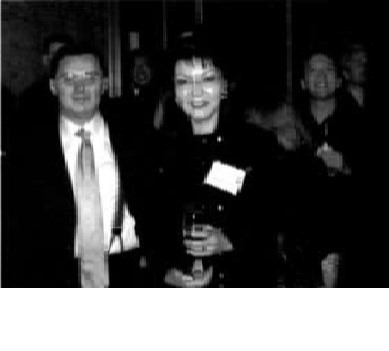
The report involved a major intelligence-gathering exercise: “to compile this report, a task force of former senior law enforcement officials and experts was assembled – including two former directors of leading national law enforcement agencies, and a former director of an international law enforcement agency – combining over 300 years of security and investigative experience.” In total, 97 “high-level officials” were interviewed off-the-record for the report, with the report’s “task force” travelling “extensively throughout the U.S. as well as to Switzerland, Belgium, France, Italy, United Kingdom, Israel, etc.,” to conduct research.11
The report goes through the information collected by a variety of U.S. law enforcement and other agencies and bodies on Kazakhgate, with the a major emphasis placed on how Global Options should go about ‘correcting’, ‘cleansing’, ‘redefining’, or ‘rebutting’ the ‘adverse views’ and ‘misimpressions’ of these bodies, by carrying out the “appropriate delivery of these rebuttals to relevant officials, department heads, and policymakers in the US and international law enforcement agencies concerned via the appropriate channels.”12 One section argues that the U.S. Attorney General’s office possesses “such an extensive list of ‘investigative facts’ related to KG and ST [Kazakhgate and Nazarbayev]” that it:
puts [Nazarbayev] and members of his close circle in direct jeopardy of potential involvement in, and possible prosecution under, U.S. criminal law. Therefore, actions must be taken to correct these impressions. On an immediate basis, our contacts in the Attorney General’s Office (and their White House counterparts) should be fostered.
At the same time, those agencies that have compromising information on Nazarbayev’s political enemies should be “carefully cultivated in the process of ‘assisting’ their investigative activities.”13 Although Global Options were keen to stress the legality of their tactics, the wording in the above report very much suggests that a foreign government was paying a company to interfere into a U.S. criminal investigation.
The Global Options report also – rather ironically – details and publishes some allegations against the Kazakh government collected by law enforcement agencies. So for example, we learn that a Kazakh delegation “featuring top officials and people close to [Nazarbayev]” spent $3 million on a visit to the United Kingdom which “according to the officials, cannot be explained otherwise but on the basis of existing bribery schemes and misuse of state funds.”14
Through this work, Alexander Mirtchev clearly got close to the country’s first family; when Global Options Group threw a reception in honour of the Kazakh president’s daughter, Dariga, in February 2004 at the Metropolitan Club in Washington DC, it was Mirtchev who escorted her to the receiving line of invited guests. However, Mirtchev’s work for Kazakhstan also allegedly included more sinister aspects, with the lobbyist reportedly15 providing Nazarbayev with restricted U.S. Customs information and mobile phone records of the regime’s political opponents. Furthermore, The Times alleged16 in an article from 2009 that officers from the UK’s Secret Intelligence Service, MI6, leaked confidential information to Global Options Management about Kazakhstan.
Whatever work Mirtchev did complete must have impressed the Kazakh leadership, as they turned to him and Global Options Management again in 2007 to produce other reports. Dubbed, along with other material as “the Super Khan papers,” these reports (totalling over 400 pages) have proved controversial, as they detailed methods to keep Kazakhstan’s ruling dynasty in power until 2035. A confidential strategy document related to these files states that this is to be achieved by “prevent[ing] intentional and unintentional, internal and external interference.”17 (The Super Khan papers’ authenticity has been disputed by the Kazakh government.18)
What is beyond doubt is that Mirtchev continued to work at a very high level in Kazakhstan, leading Intelligence Online in 2009 to call Mirtchev “Nazarbayev’s closest associate in the U.S.”19 In 2007, Mirtchev became a Senior Economic Adviser to the then Prime Minister of Kazakhstan, Karim Massimov,20 and in October 2008 became an independent director of Samruk Kazyna, the main holding company for Kazakh state businesses, a position he held until March 2018. He does not seem to have been a very hands-on director, taking part in only 4 of the 18 meetings of Samruk Kazyna’s audit committee in 2016, including none of the 14 in person meetings. He attended 16 out of 19 of the other meetings, though this was still the worst attendance record that year of any of the directors. 21 His 2017 record was slightly better – this time he had the second worst attendance record of the board.22
A celebrity lifestyle
Mirtchev certainly enjoys the high life; while his main residence is a luxury condominium in Washington DC’s Georgetown neighbourhood, he also owns or controls properties in Italy and on Miami’s oceanfront South Beach. Information related to Mirtchev’s financial transactions demonstrates that the man has money to burn. Unverified details relating to Mirtchev’s financial transactions indicate an incredible spree of spending in June 2015, where in just a 19-day period (June 9 to June 27), he spent over $180,600. This includes some of the following expenditure, highlighting his almost A-list celebrity lifestyle:
- On 11 June 2015, Mirtchev spends over $34,000 in Christie’s in London, and takes a flight costing nearly $7,000 to Frankfurt, Germany.
- He spends over $52,000 at a luxury health spa on the shore of Lake Wörth in Austria on 12 June (which includes a $9,400 payment to one of the clinic’s medical directors), and flies back to London from Ljublana on 13 June.
- He spends another $5,860 at Christie’s – this time in Paris – on 15 June.
- Mirtchev drops $26,360 at The 5* Stafford hotel in London on 18 June, takes a flight costing $3,735 from London to Astana, Kazakhstan on the same day.
- While in Kazakhstan, he spends over $17,000 at The Radisson in Astana, and flies back to London on 23 June spending $8,442 on the flight and $4,648 for a one-night stay at the 5* Athenaeum Hotel in Mayfair.
- The next day (24 June) he flies to Washington DC on a flight costing him $9,364, before travelling to New York where he spends over $1,600 in a wine shop.

Other records suggest that such profligate spending was not unusual for Mirtchev: he charged more than $1 million to his AmEx card in 2013, about half of it for travel.
$500 million to burn? Correspondence with a GOP fundraiser
What is Mirtchev’s net worth? The above spending profile suggests Mirtchev has at his disposal a fortune at least in the tens of millions of dollars. Yet other purchases suggest he has a fortune far in excess of that. For example, Mirtchev purchased a post-Impressionist artwork by Pierre Bonnard for $15 million in 2014. Following the purchase, Mirtchev was emailed by a woman called Georgette Mosbacher.
At the time of the correspondence with Mirtchev, Mosbacher held the position of CEO of Borghese, a cosmetics manufacturer based in New York. However, she is better known for her work with the Republican Party in the United States. Not only was she a former co-chair of the Republican National Committee’s Finance Committee, she was national co-chairman of Senator John McCain’s 2000 presidential campaign and helped fundraising efforts for his later bid in 2008, as well as, amongst others, George W. Bush’s run in 2004. Unlike many of the Republican Party elite, she supported the presidential bid of Donald Trump, whom she has known for several decades, saying to the Financial Times in 2016 that he was “a decent man… He treats women very well.”23 Such loyalty appears to have paid off: Mosbacher was confirmed by the United States Senate as the U.S. Ambassador to Poland in July 2018.
In Mosbacher’s November 2014 to Mirtchev, she wrote:
Alexander My Darling, I understand the deal for the Bonnard has been finalized. In all due respect, had you bought this painting at auction, you would have paid a commission, I fully expected to hear from you with some offer in appreciation. […] Friendship should not be taken for granted […] I’m still hoping you will do the right thing.
The tone of the email indicates a close friendship, and suggests that not only was Mosbacher involved in the purchase of the painting, but that she expected something of value in return, suggesting perhaps a financial relationship between the two.

A later email to Mirtchev from Mosbacher, sent in June 2015, suggests that Mirtchev’s wealth could be much greater than even what the above spending suggests:
The only Formula 1 racetrack in the U.S., located in Texas, is up for sale. No one is aware of this at this point. Please see the attached. If you would like to talk more I can put you in contact directly with the principal […]. I estimate the cost will be about $500 million. The complex is profitable. Financial’s [sic] are available with a signed Confidentiality agreement (upon request). […] I wanted to alert you to this unique and extraordinary opportunity. Though the phrase ‘once in a lifetime opportunity’ may sound cliché, this one- as you will see- fits the bill
At such an extreme price – a mere $500 million – the racetrack, the Circuit of the Americas, could only be of interest to the world’s richest billionaires, so it seems surprising that the person Mosbacher was pitching to Mirtchev, who is not an oligarch, or someone even on the Forbes 400 list. Ultimately Mirtchev did not buy the racetrack, but it suggests that Mosbacher at least considered Mirtchev’s wealth to be in the hundreds of millions, if not billions. Was Mosbacher sending Mirtchev the information in order for him to forward on to his wealthy contacts? Possibly, although there is no indication of this in the email: Mosbacher specifically says that she can put Mirtchev himself in contact with the track’s principal.
If Mirtchev did have this money at his disposal, just where was he getting it from?
Clearly, Mirtchev is likely to have been paid handsomely – many millions of dollars – for his work promoting the interests of Kazakhstan and individuals like Gulnara Karimova.
In his book The Godfather-in-Law, Rakhat Aliyev alleges that Mirtchev was paid $26 million for his work for the government of Kazakhstan, most of it in cash. Such a high fee might not be unusual in such circles: Paul Manafort, a 8 political consultant indicted on federal charges as part of the Mueller investigation, is accused by prosecutors working on the case of receiving up to $60 million for his consultancy work in Ukraine.24
Manafort, like Mirtchev, did some work for Oleg Deripaska, who, according to The Wall Street Journal, paid Global Options Management – 50 percent of which was owned by Mirtchev – at least $9.75 million in a single wire transfer.25

Mirtchev’s position at Samruk Kazyna would also be well remunerated. According to Rakhat Aliyev, Mirtchev received $70,000 per annum for his work at Samruk Kazyna, a figure which roughly tallies with the company’s annual report which states that the total remuneration of the Samruk Kazyna management board in 2016 was 293 million Kazakh tenge26 – around $890,000 – making an average salary of $80,000 for each of the 11 directors (although it is unclear from the report if the salaries would be split evenly).
Mirtchev is also likely to receive a salary from the law firm Stewart & Stewart, where he is a director, and from his positions on a variety of think-tanks: Mirtchev is a Board Director and Member of the Executive Committee of the Atlantic Council, and was also member of the Wilson National Cabinet at the Wilson Center. It is worth noting that Mirtchev has given between $100,000 and $250,000 per year to the Atlantic Council in 2015, 2016 and 201727, and has donated at least $470,000 to the Wilson Center.
But these roles and their associated salaries would still not explain Mirtchev’s potential ability to acquire a racetrack valued at half a billion dollars. Mirtchev has never appeared in the Forbes 400 of the richest Americans, the lowest ranking members of which in 2018 have a net worth of $2.1 billion.
Indeed, Mirtchev’s biography in the 2010 Samruk Kazyna annual report details little involvement in business apart from his own Krull Corporation, instead describing him as having had “a distinguished academic career”. Even Mirtchev’s own lawyers describe him as “an academic, macroeconomic advisor, and author.”28 Perhaps realising the strangeness of having an American academic sit on the board of Kazakhstan’s most important state company, Mirtchev’s Samruk Kazyna biography was changed in 2015 to the following:
“he serves and has served as a chairman and director of multi-billion dollar international industrial enterprises, chairman of a NASDAQ-listed joint venture corporation with a high-end risk-mitigation services, an independent director and chairman of the board of directors of Sustainable development fund Kazyna, a director of Stewart & Stewart – a top-rated Washington, D.C. law firm.”29
There is no indication of what the multi-billion dollar international industrial enterprises Mirtchev supposedly chaired are. Performing a director search for Alexander Mirtchev on Orbis, a database with information on over 300 million companies worldwide, results in only three hits: Krull (UK), Simara Ltd (a UK company registered in 2018 that Mirtchev directs), and the Atlantic Council. Media databases such as Factiva also give no hits on Mirtchev’s apparent involvement in such “high-end” companies, nor are there any media reports of Mirtchev ever owning or selling major stakes in any companies. In 2017, a London based investment manager announced it had hired a man called Alexander Mirtchev as a Senior Analyst, though it is unclear whether this is Alexander Vassilev Mirtchev. Even if it is, and even if Mirtchev is raking in fees from these as yet unknown directorships and chairmanships, these salaries would likely be six figure dollar sums per annum, perhaps seven, but not more.
A Kazakh middleman?
There is another theory – that Mirtchev is responsible for money that does not belong to him, and is thus acting as middleman in such deals as the potential Formula One racetrack purchase.
His lavish lifestyle would therefore be supported by the people he is moving money for. Such allegations that Mirtchev is involved in this kind of activity on behalf of figures in power in Kazakhstan are in the public domain. A leaked 2009 report from intelligence company Stratfor commented that Mirtchev was “thought to have stashed away millions of dollars from the country’s deep energy coffers to help line Nazarbayev’s pockets”30 – in effect, holding the position that James Giffen held in the mid to late 90s. And while there is no proof to be found in company documents, there is certainly a paper trail that suggests a link between Mirtchev’s associates and powerful figures in Kazakhstan.
Documents from Companies House in the United Kingdom show that Mirtchev was a director of a company called Krull Corporation (UK) Ltd that was registered in January 1996.
The company’s accounts from 1996-1998 state that the ultimate controlling party was at this time Krull Corporation Inc., the U.S. consultancy firm headed by Mirtchev.
From 1999-2004, the ultimate controlling party was Brookrange Ltd, a company registered in Gibraltar, and owned, according to Krull UK’s accounts, by a woman called Stefka Nikolova, whose distinct lack of an online presence suggests she may be a nominee or proxy owner. Despite this change of ownership, Krull Corporation Inc was still named as a ‘related party’ and Mirtchev retained his role as director.
From 1996-2004, Krull UK did not make any money, its modest profits in some years cancelled out by other years’ losses, resulting in a net loss of over £56,000 in that timeframe. We know from the above that Mirtchev started to work for the Kazakh government around 2002/2003, and the change in Krull UK’s structure from 2004 is noticeable.
It is in 2004 that a man called Kaloyan Dimitrov, who had been a director of Krull UK from August 1999, bought Krull UK’s shares from Brookrange Ltd. Mirtchev resigned as a director of Krull UK at the end of 2004, and accounts state that Krull Corporation Inc ceased to be a related party at the beginning of 2005. So on the surface, it would seem that Mirtchev severed ties with Krull UK.
However, not only did the company continued to bear the Krull name and be owned by an associate of Mirtchev – Kaloyan Dimitrov, his fellow director in Krull UK from 1999-2004 – but emails from Dimitrov to a bank official at HSBC in January 2008 speak of “payments that came into the accounts of Krull Corp. and GlobalOptions Management Inc”, both of which were entities owned or co-owned by Mirtchev.
Furthermore, in 2008 the Wall Street Journal reported31 that Mirtchev was involved in discussions regarding American oil companies looking to get into Kazakhstan, along with “an associate of his, Kaloyan Dimitrov.” The fact that Dimitrov’s relationship with Mirtchev appears to have extended to Kazakhstan suggests a continued close link between the two.
Enter a Kazakh PEP
Another important change happened to Krull UK around 2004: it formed a relationship with two more ‘related parties’ – companies called Global Industries (UK) Ltd and New Mount Limited. Krull UK’s accounts indicate that Global Industries (UK) Ltd first became a ‘debtor’ – in other words, a customer – in 2004, when Mirtchev was still a Krull UK director, and that New Mount Limited became a creditor – an organisation financially backing the company – in 2005, to the tune of £1.6 million.
Global Industries (UK) Ltd, a company registered in the UK, was previously called Krull Metals Corporation (UK) Ltd prior to August 2004. Like Krull UK, this company failed to make any significant profit until 2004, though in 2006 – several years after Mirtchev officially severed ties with Krull UK – it made £64,000 and £72,000 in 2007.
Krull UK’s accounts state that a woman named Aigul Nurieva owned at the time 50 percent of the share capital of Global Industries (UK) Ltd and was the controlling party of New Mount Ltd. This is important because Nurieva is alleged to be a key figure in the management of the Kazakh ruling elite’s wealth. At the very least, she is a politically exposed person (PEP) – a close associate of a politician – a designation which causes enhanced levels of due diligence to be performed in business transactions.
In 2014, Tele2, a Swedish telecoms company that partnered with Nurieva in Kazakhstan, designated her as a PEP, noting
“a potential link between Ms. Aigul Nuri[y]eva and [the then Kazakh] Prime Minister Massimov… She confirms that she knows Mr. Massimov from the period prior to him entering politics, when they were colleagues, but that they do not have a business relationship today.”32
The Wall Street Journal reported that Nurieva, a banker by profession, is also an investor with Massimov, who was the prime minister of Kazakhstan at the time, in a company in Singapore.33
As noted above, Mirtchev was an advisor to Massimov from around 2007. Nurieva remained a director of Global Industries (UK) Ltd until August 2008, according to filings from Companies House in the UK. Krull Corporation (UK) Ltd was dissolved in 2010.
Less is known about the other of Krull UK’s ‘related parties’ – New Mount Ltd. Accounts from Global Industries (UK) Ltd indicate that the money invested into Krull UK likely came from there: New Mount gave £1.6 million to Global Industries (UK) Ltd in 2005. It is not clear where New Mount Limited is registered. Without further information it is difficult to ascertain the exact relationship between Nurieva and Krull UK, but the financial link to a PEP is curious: why was a Kazakh banker seemingly bankrolling Krull UK after Mirtchev’s apparent departure from the company?
The Wall Street Journal alleged that Nurieva “help[ed] Mr. Mirtchev manage offshore assets of the Nazarbayev clan,
34
” citing people with knowledge of the Nazarbayev family’s finances. It added that both the FBI and the Manhattan District Attorney were looking into Mirtchev’s banking activities.
At the time a lawyer for Mirtchev commented that he “has never moved any money to any accounts on behalf of the government or senior officials of Kazakhstan,” and a spokesman for Aigul Nurieva denied that she manages money for the Nazarbayevs.35
Opaque money trails
The Wall Street Journal reported that after Brookrange Ltd ceased to be the owner of Krull UK it made wire transfers some of which were over $100 million to obscure companies around the world, according to people who had seen records of the transfers. The article reported: “People with knowledge of the Nazarbayev family finances say they believe Brookrange has been used to manage the Kazakh first family’s assets.”36 By this point Brookrange Ltd may have ceased its relationship with Mirtchev’s Krull Corporation, although it is unclear whether Mirtchev had any link or involvement in Brookrange from 2004: information regarding this period of the company’s history is not available from Gibraltar Companies House, which only provides information on the company’s present status.
A memo attached to Dimitrov’s emails, signed by Stefka Nikolova, suggests that in one instance the money being moved amounted to over $50 million and pertained to certain companies receiving “syndicated financing from corporate sources in the Baltic Republic and the CIS” in relation to “a development project in Central Asia and Ukraine in the energy industry.”
However, it appears that the bank that held the money – Barclays – had some concerns as to the origin of the money flowing through Brookrange’s accounts and asked Kaloyan Dimitrov – known as Kal – for more clarification: a December 2007 email sent by an employee of Barclays Bank to Kal Dimitrov’s Brookrange AOL email address reads as follows:
I have reviewed the paperwork you provided in respect of the US$ funds due and of course the account profile. You will I am sure understand that I am obliged for legal reasons to ascertain the origins of these funds prior to them being credited to the account. To this end could you please let me have copies of any supporting paperwork (in addition to the memorandums that I hold) that provides evidence of the sources of these funds. Regrettably I am unable to accept assurances that these are from syndicated funds. I need to understand the source of these funds whether the names of investors or the banks providing the facilities. This documentation will be needed prior to the funds being remitted. I do not wish
to be placed in apposition [sic] of being unable to accept these and look forward to your earliest attention.37
Dimitrov replied later the same day asking for a secure email address in order to send the documentation. It is not known what documents were sent and whether the transaction was ultimately accepted. Two weeks later, another Barclays employee wrote to Kal Dimitrov with a similar query:
A couple of large payments have landed on my desk today. I know you have been in touch with [redacted] recently and my guess is that he would be expecting these… Could you kindly send me a note detailing the nature of these transactions and how they fit in with the funds recently received into the account? Some copy invoices / contracts pertaining to these transactions would also be appreciated.
Further allegations followed in 2015 when Kaloyan Dimitrov’s brother, Asparuh, brought a legal case in Hong Kong against a Chinese financier, Dominic Lau. As reported by Intelligence Online38, Asparuh Dimitrov was attempting to recover $25 million on behalf of Kaloyan who had died the year before.
This is the same Kaloyan Dimitrov who was co-director with Mirtchev in Krull UK from 1999-2004, the man who stayed on as a director of Krull UK after Mirtchev left the company, but was reportedly involved along with Mirtchev in discussions regarding American oil companies looking to get into Kazakhstan in 2008.
According to Intelligence Online, Kaloyan had instructed Lau to invest $25 million on his behalf in Hong Kong from 2008 to 2010 in a series of Chinese companies. After Kaloyan’s death, Lau refused to return the money to his family, asserting that it had actually belonged to Mirtchev, and that Kal Dimitrov was acting as an agent for Mirtchev. However, the judge rejected Lau’s version of events due to lack of evidence in October 2017.
The case shines more light on Mirtchev’s associate, Kal Dimitrov. The court case from Hong Kong indicates that Kal was a rich man in his own right. Where had the money come from? Intelligence Online article says that the Dimitrov brothers both used to head the London based footballer’s agency Etar.
However, information from the UK’s Companies House shows that Etar Ltd – along with two other companies registered in the UK and directed by the Dimitrovs – did not make much profit. The above cited email correspondence with Barclays indicate that Kal Dimitrov was clearly involved with multi-million deals outside of the UK through Brookrange though, as with Mirtchev, little information is to be found on the Orbis company database regarding Dimitrov’s involvement in a other companies.
The above emails to Barclays coupled with the Intelligence Online article raise the possibility that this money was earned directly or indirectly through his relationship with Mirtchev.
The concealment of one’s involvement in companies’ shareholding through the use of proxies is a legal practice, though it is interesting to note how both Kal Dimitrov and Mirtchev were happy to put their names to UK companies that have made little money, while seemingly making millions of dollars through companies registered elsewhere in rather more opaque circumstances.
In a curious footnote, Dimitrov’s Etar Ltd – which describes itself as “dedicated to the marketing and management of sport”39 – appears to have represented both Mirtchev and Georgette Mosbacher:
several press releases which feature comments by Mirtchev and one written by Mosbacher are both footnoted with the words “for further information please contact etar.co.uk”.40
Questions raised
Mirtchev has never been charged with any crime, and, as mentioned above, Robert Mueller’s probe ended without any official mention of Mirtchev. One can speculate that Mirtchev’s relationship with Deripaska may well have been the focus, given that Paul Manafort also worked with the Russian oligarch, although there is no evidence to suggest that Mirtchev ever worked with Manafort in this or any other matter. But at the very least, the source of Mirtchev’s vast wealth is unclear, and there appears to be a case for him to answer, an opinion apparently shared by the FBI, whose investigation into Mirtchev that began around 2008 was still open as of 2016, according to a source familiar with the investigation.
There are also a considerable number of questions raised by the above research on whether Mirtchev’s close ties with the political elite in Washington DC and positions in various U.S. thinktanks has had any effect on the U.S government’s policy toward Kazakhstan, dating right back to the Department of Justice’s prosecution of James Giffen.
The above quoted emails also raise questions for the current U.S. Ambassador to Poland, Georgette Mosbacher.
At the time she wrote the emails – 2014 and 2015 – it was not only known that Mirtchev had represented dubious characters such as Gulnara Karimova, but media articles regarding the FBI investigation into Mirtchev and allegations about his possible involvement in the management of the financial affairs of the Kazakh elite were also in the public domain. Mosbacher, as a Republican Party fundraiser, should be well aware of the need for due diligence of individuals and close scrutiny of the origin of funds.
Time will tell whether other parties are asking similar questions about the nature of the relationship between Ambassador Mosbacher and Alexander Mirtchev, and about Mirtchev’s close relationship with key figures in Kazakhstan’s ruling elite.
Investigation sources and links:
- 2 Wall Street Journal, 22 July 2008, Kazakhstan Corruption: Exile Alleges New Detail, https://www.wsj.com/articles/SB121667622143971475
- 3 The Diplomat, 24 October 2016, Nazarbayev and the Rise of the Kleptocrats https://thediplomat.com/2016/10/nazarbayev-and-the-rise-of-the-kleptocrats/; CNBC, 16 January 2018, Kazakhstan is a ‘kleptocracy’ ruled by an autocrat. It’s also an increasingly important strategic ally, https://www.cnbc.com/2018/01/16/kazakhstan-is-a-kleptocracy-ruled-by-an-autocrat-its-also-an-increasingly-importantstrategic- ally.html
- 4 Reuters, 11 May 2007, U.S. revoked Deripaska visa – State Dep’t official, https://www.reuters.com/article/deripaskachrysler- usa/u-s-revoked-deripaska-visa-state-dept-official-idUSN1143738620070511
- 5 New York Times, 26 May 2017, Russian Once Tied to Trump Aide Seeks Immunity to Cooperate With Congress, https://www.nytimes.com/2017/05/26/us/politics/oleg-deripaska-paul-manafort.html
- 6 US Department of Justice, 18 February 2016, VimpelCom Limited and Unitel LLC Enter into Global Foreign Bribery Resolution of More Than $795 Million; United States Seeks $850 Million Forfeiture in Corrupt Proceeds of Bribery Scheme, https://www.justice.gov/opa/pr/vimpelcom-limited-and-unitel-llc-enter-global-foreign-bribery-resolution-more-795- million
- 7 RFE/RL, 24 June 2018, Defense Attorney Meets With Gulnara Karimova, Indicates She Is Open To ‘Concessions’, https://www.rferl.org/a/uzbekistan-gulnara-karimova-defense-lawyer-concessions-corruption-mirziyoev/29316295.html
- 8 Southern District of New York, United States Of America V James H. Giffen, Defendant. Sealed Complaint. (filed 28 May
- 2003), http://www.justice.gov/sites/default/files/criminal-fraud/legacy/2011/02/16/03-28-03giffen-complaint.pdf. The
- indictment does not refer to Nazarbayev by name, but as “KO-2”: a document from an appeal court in relation to the case
- states that the bribes were made to “the President of Kazakhstan” confirming that KO-2 is Nazarbayev: United States
- Court of Appeals for the Second Circuit. United States of America V James H. Giffen, Defendant-Appellee. (8 December
- 2006 – decision), http://www.justice.gov/sites/default/files/criminal-fraud/legacy/2011/02/16/12-08-06giffen-opinion.pdf.
- Furthermore, testimony heard during the trial identifies each of the parties by name in relation to their bank accounts. See
- Southern District of New York, United States Of America V James H. Giffen, Defendant. Hearing (3 June 2004), http://courses.wcupa.edu/rbove/eco343/040Compecon/Soviet/Kazakh/040603giffen.txt
- 9 Nazarbayev is referred to in the document as “ST” but certain parts of the document use Nazarbayev’s name in sections related to ST, clearly indicating that ST is Nazarbayev. In another section, the document says that “KO-2 is ST” in reference to the Giffen indictment. Footnote 4 above establishes that KO-2 is Nazarbayev.
- 10 GlobalOptions Management, 2003, Project ST (unpublished).
- 11 Ibid.
- 12 Ibid.
- 13 Ibid.
- 14 Ibid.
- 15 Wall Street Journal, 22 July 2008, op. cit.
- 16 The Times, 11 January 2009, MI6 officers allegedly leak oil dossier to Kazakhstan, https://www.thetimes.co.uk/article/mi6-officers-allegedly-leak-oil-dossier-to-kazakhstan-v3kvgkslghw
- 17 Spiegel, 19 May 2009, Ex-Stepson Talks in Family Feud: The Long Arm of Kazakhstan’s President, https://www.spiegel.de/international/world/ex-stepson-talks-in-family-feud-the-long-arm-of-kazakhstan-s-president-a-625720-2.html
- 18 DC Legal Truths, 31 May 2013, Hourani v. Mirtchev Case Background, https://dclegaltruths.wordpress.com/2013/05/31/hourani-v-mirtchev/
- 19 Intelligence Online, 16 July 2009, Dealing with Dissidents Who Flew Coop
- 20 Reported in Samruk Kazyna Annual Report 2010
- 21 Samruk Kazyna Annual Report 2016, https://www.raexpert.kz/go/2016_en_fnb_sk_1.pdf, p77.
- 22 Samruk Kazyna Annual Report Part 1 2017, https://sk.kz/local/ajax/download.php?id=874884 , p72.
- 23 The Financial Times, 13 October 2016, Fundraiser Georgette Mosbacher on why Trump is a ‘decent man’,
- https://www.ft.com/content/dbe6d0c6-8f92-11e6-a72e-b428cb934b78.
- 24 CNN, 30 July 2018, Mueller says Manafort earned $60M from Ukraine consulting, https://edition.cnn.com/2018/07/30/politics/mueller-says-manafort-earned-60m-from-ukraine-consulting/index.html
- 25 The Wall Street Journal, 10 October 2008, Russia’s Deripaska Faces Western Investigations, https://www.wsj.com/articles/SB122359420472121077
- 26 Samruk Kazyna Annual Report 2016, p93.
- 27 Atlantic Council Annual Report 2017-2018, https://www.atlanticcouncil.org/images/publications/20180514-Atlantic-Council-Annual-Report-sm.pdf, p74.
- 28 Medium.com, 15 August 2018, Bracewell Wins Dismissal for Dr. Alexander Mirtchev and Krull Corporation, https://medium.com/@alexandermirtchev2/bracewell-wins-dismissal-for-dr-alexander-mirtchev-f68aab7cc95c
- 29 Samruk Kazyna Annual Report 2015.
- 30 Stratfor Global Intelligence, 30 April 2009, Kazakhstan And Turkmenistan: A Look at Political and Regulatory Environments, https://wikileaks.org/gifiles/attach/175/175880_PARKER%20090430.pdf
- 31 Wall Street Journal, 29 July 2008, Perle Linked to Kurdish Oil Plan, https://www.wsj.com/articles/SB121729971113092303
- 32 Tele2, 17 December 2014, White paper: Tele2’s operations in Kazakhstan, https://www.tele2.com/globalassets/global/tele2_whitepaper_kazakhstan.pdf
- 33 Wall Street Journal, 22 July 2008, op. cit.
- 34 Ibid.
- 35 Ibid. Furthermore, in response to a later Wall Street Journal article about Global Options work with Deripaska, Mirtchev wrote a letter saying that “I can assure readers, as I did in the article, that Global Options Management follows all laws and regulations in the jurisdiction in which it operates. The perceptions generated about me and my company from this article portray an unfair picture of my business practices and activities, while the sources for this story remain unnamed. Any endeavours that I have ever undertaken, business or personal, have been performed lawfully and ethically.” Wall Street Journal, 22 October 2008, Deripaska Affirms They Are Honorable, https://www.wsj.com/articles/SB122463389468656739
- 36 Wall Street Journal, 22 July 2008, op. cit.
- 37 Correspondence between Barclays Knightsbridge International Banking Centre and Brookrange, 2007 (unpublished).
- 38 Intelligence Online, 15 November 2017, Hong Kong case sheds light on Kazakh-Chinese connections, https://www.intelligenceonline.com/international-dealmaking/2017/11/15/hong-kong-case-sheds-light-on-kazakhchinese-connections,108280874-art.
- 39 LinkedIn, undated, https://www.linkedin.com/company/etar-ltd
- 40 Accessed via the Factiva database. For example, a 16 December 2013 Press Association newswire written by Mirtchev on energy issues and a 25 April 2011 Marketwire press release by Mosbacher on the uncertainty of short and long-term tradeoffs between debt and tax cuts are both footnoted in this way.

